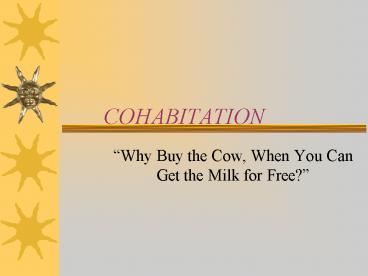COHABITATION PowerPoint PPT Presentation
1 / 17
Title: COHABITATION
1
COHABITATION
- Why Buy the Cow, When You Can Get the Milk for
Free?
2
The Problem
- Cohabitation violates the institute of marriage
by lacking a true commitment. - Cohabitation
- Living together in a sexual relationship without
being married
3
Background Leading to the Problem
- In 1960, of the 52,799,000 households, only
439,000 were unmarried cohabitants as opposed to
104,705,000 households in 2000. - In the 2000, there were 4,736,000 unmarried
cohabitants in the United States.
4
Reasons Given for Cohabitation
- Economic advantages
- We can save money by sharing living expenses.
- Time together
- We are able to spend more time together.
5
Reasons for Cohabitation (cont.)
- Increased intimacy
- We have more opportunities to share sexual and
emotional intimacy without getting married. - Less complicated dissolution
- If the relationship doesnt work out, there is
no messy divorce.
6
Reasons for Cohabitation (cont.)
- Testing compatibility
- Living together enables us to better learn about
each others habits and character and see how we
operate together day-to-day. - Trial marriage
- We are planning to marry soon.
7
New Info on Cohabitation
- Cohabitation is on the rise for older individuals
- Reasons
- Avoid loss of financial benefits such as alimony,
welfare, or pension checks - Loss of a spouse to death or divorce and fear of
losing another spouse - Pain and anger as a result of a divorce
8
Health Effects of Cohabitation
- Increased risk of drug abuse
- Higher risk of physical, emotional, and mental
abuse - Unstable relationship
- Higher overall rates of violence among
cohabitors. - Violent relationship can lead to depression,
suicide, homicide, or death.
9
Possible Solutions
- Do Not Cohabitate
- Have faith in your relationship
- Have high self-esteem
- Legal Cohabitation Agreement
- Entered into by unmarried person who live
together - In agreement, the parties can agree with respect
to acquisition, disposition of property upon
separation, personal rights, obligation of either
party, control of property, etc.
10
Best Solution
- Refrain from Cohabitation
- Couples living together have the lowest level of
premarital satisfaction when compared to other
living arrangements. - Married couples that cohabitated prior to
marriage have poorer communication skills in
discussing problems than couples that did not
cohabitate. - Cohabitating couples are less sexually committed
and trustworthy.
11
Summary
- Cohabitation rates increased from 500,000 in 1970
to 5.5 million people cohabitating in 2000 - 60-75 of first marriages preceded by
cohabitation - 80-85 of re-marriages preceded by cohabitation
12
Summary
- Delay of marriage until median age of 25 for
females and 27 for males - Concern over continuing high rates of divorce has
led to couples seeking a weaker form of union
with less commitment to lifelong marriage
13
Summary
- Several studies show that cohabitating increases
the risk of drug use and physical, mental , and
emotional abuse. - Overall rates of violence in cohabitating couples
were double that of married couples and severe
violence was 5 times higher for cohabitors.
14
Summary
- Cohabitating couples have lower levels of
personal happiness and higher rates of depression
than married couples - Cohabitors have more negative attitudes about
marriage than non-cohabitors.
15
Summary
- Do Not Cohabitate
- Best solution
- Marriages preceded by cohabitation are more
likely to end in divorce. - Cohabitation is generally not a good way to
prepare for marriage or to avoid divorce. - Legal Cohabitation Agreement
16
The Bottom Line
- Lack of commitment to marriage
- A strong commitment is the basis of marriage.
- Cohabitating couples are more oriented toward
their own personal autonomy. - Cohabitors are more willing to terminate the
relationship. - Inability to make a decision about marriage
- Cohabitation reflects uncertainty.
17
The End Result
- Continuing to cohabitate will continue to raise
the divorce rate for couples who do get married
after cohabitation. - Cohabitation increases the chances of having
children out of wedlock. - Ending the cohabitation and divorce will result
in single parent homes.

